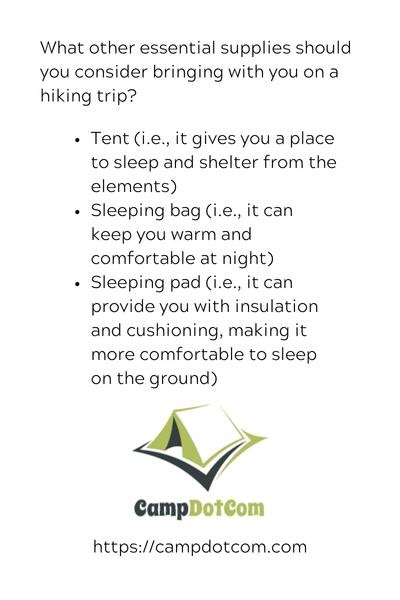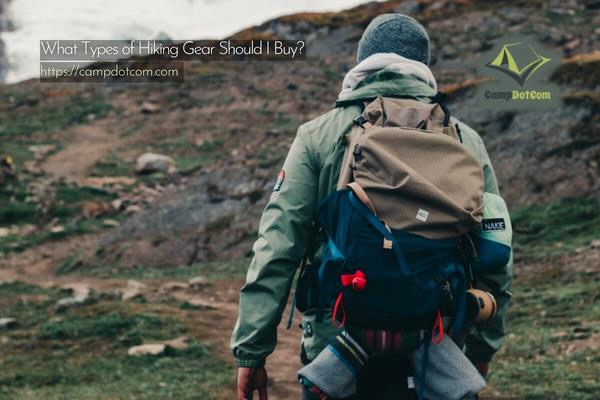What Types of Hiking Gear Should I Buy?
Hiking is a popular outdoor activity that allows you to explore the beauty of nature while getting some exercise. However, it's important to have the right gear in order to have a safe and comfortable hike.

More Things To Know About What Types of Hiking Gear Should I Buy
Types of Hiking Gear

There are many types of hiking gear that can help make your hike more enjoyable and safe. Here are some of the most common types of gear:
- Backpacks: A backpack is essential for carrying all of your gear and supplies. Look for one that fits well and has a comfortable hip belt to distribute the weight evenly across your body.
- Footwear: Proper footwear is essential for a successful hike. Look for shoes or boots with good support, cushioning, and traction. Consider the terrain you'll be hiking on and choose shoes that are appropriate.
- Clothing: Wear layers of clothing to stay warm and dry. Start with a moisture-wicking base layer, add a mid-layer for insulation, and top it off with a water-resistant or waterproof outer layer. You should also bring a hat, gloves, and a scarf to protect against the elements.
- Water bottles and hydration: Dehydration can be a serious issue on the trail, so it's important to bring plenty of water. Look for a water bottle or hydration pack that has a high capacity and is easy to refill on the go.
- Maps and navigation: It's always a good idea to bring a map and compass when hiking, especially if you're in a new area. Consider investing in a GPS device or downloading a hiking app to your phone to help you navigate and track your progress.
- First aid kit: Accidents can happen on the trail, so it's important to be prepared. Put together a small first aid kit with basic supplies like band-aids, antiseptic wipes, and ibuprofen.
- Emergency gear: In case of an emergency, it's a good idea to bring some extra gear, such as a headlamp or flashlight, a knife, a whistle, and a fire starter.
- Sleeping gear: If you're planning an overnight hike, you'll need to bring some sleeping gear, such as a tent, sleeping bag, and sleeping pad.
- Cooking gear: If you're planning on cooking your own meals on the trail, you'll need some basic cooking gear, such as a stove, pots, and utensils.
- Other gear: Depending on your specific needs, you may also want to bring other gear, such as a hat or sunglasses to protect against the sun, insect repellent, and sunscreen.
Essential Camping Supplies
In addition to the hiking gear mentioned above, there are a few other essential supplies that you should consider bringing with you on a camping trip. These include:
- Tent: A tent provides a place to sleep and shelter from the elements. Consider the size of the tent based on how many people you'll be camping with and the weather conditions you'll be facing.
- Sleeping bag: A sleeping bag will keep you warm and comfortable at night. Look for one that is rated for the temperature range you'll be camping in.
- Sleeping pad: A sleeping pad provides insulation and cushioning, making it more comfortable to sleep on the ground.
- Cooking gear: You'll need some basic cooking gear, such as a stove, pots and pans, utensils, and a cooler to store perishable food items.
- Food: Bring enough non-perishable food to sustain you for the duration of your trip. Don't forget to pack a water purification system if you'll be using natural water sources.
- Personal hygiene supplies: Pack items like toothpaste, a toothbrush, soap, and a towel to keep yourself clean and hygienic during your trip.
- Multipurpose tool: A multitool or pocket knife can come in handy for a variety of tasks, such as cutting rope or opening cans.
By bringing these essential supplies, you'll be well-equipped to handle any situation that may arise while camping. Remember to always follow Leave No Trace principles and properly dispose of any trash or waste to preserve the beauty of the natural environment.
By investing in the right hiking gear, you'll be well-equipped to handle any situation that may arise on the trail. Remember to always check the weather forecast and plan accordingly, and let someone know your hiking plans and expected return time. Happy trails!
Original post here: What Types of Hiking Gear Should I Buy?
Comments
Post a Comment